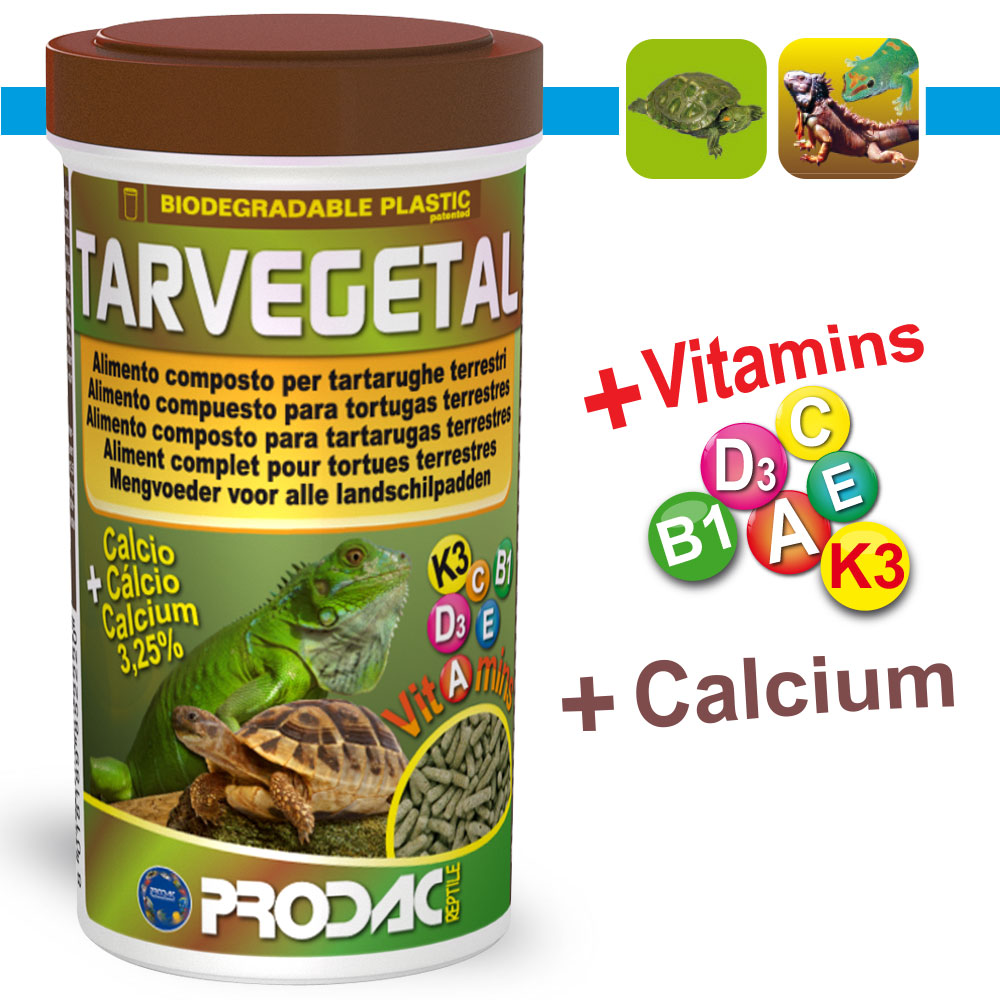
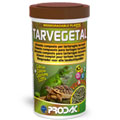
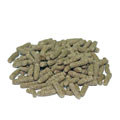
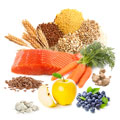
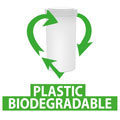
Compound food in sticks for tortoises, especially formulated for their specific protein, fibre, calcium & phosphorus requirements.
Composition: cereals, herbs, mineral substances, soja, vegetable by products origin, yeasts, fish and fish by products, wheat germ, linseed, apple, cranberries.
Nutritional additives: Vitamin A (3a672a) 25.000 I.U./kg, Vitamin D3 (3a671) 2.000 I.U./kg, Vitamin C (3a312) 1000 mg/kg, Vitamin E (3a700) 100 mg/kg, Vitamina K3 (3a710) 10 mg/kg, Vitamina B1 (3a821) 19,6 mg/kg.
Analytical constituents: raw proteins 13,62%, raw ashes 12,00%, raw fats 3,09%, raw fibres 8,23%, moisture 5,64%, calcium 3,00%, phosphorus 0,40%.
Available size:
250 ml - 60 gr - Item code TARVEG250
1200 ml - 260 gr - Item code TARVEG1200
10,5 lts - 2,3 Kg - Item code TARVEG3200
23 lts - 5 Kg - Item code TARVEG5KG
VITAMINS CONTAINED IN THE DIET OF DOMESTIC FISH
• Vitamin A. Also called retinol, it is a fat-soluble vitamin, which means it can be stored in the animal's fatty tissues and liver, and released in the body when needed. Vitamin A in fish promotes the proper renewal of epithelial tissues and the proper functioning of eyesight processes, in addition to regulating body development and to its anti-oxidant activities. Signs of deficiency: exophthalmos (bulging eyes), depigmentation, corneal opacity, anorexia and oedema, stunted growth.
• Vitamin C. L-ascorbic acid is a water-soluble vitamin that is essential for fish (their bodies are unable to produce it) and cannot be stored in their bodies. Fish therefore need a constant intake of vitamin C through Prodac food. This is one of the most important vitamins: in fish, it has anti-oxidant properties and stimulates the immune system and also promotes proper muscle development, wound healing and bone growth. It also facilitates the absorption of some minerals in the intestines (such as iron) and the synthesis of important hormones. Vitamin C deficiency causes rickets, bone deformities, fin corrosion, opaque eyes, skin haemorrhage and loss of body mass.
• Vitamin D3. Colecalciferol, another name of vitamin D3, is a fat-soluble hormone that in animals works as modulator of calcium and phosphorus absorption in the intestines and regulates their functions in the body. It also regulates parathyroid hormones. This is an essential vitamin that fish ingest in Prodac food and is then stored in the liver and in fatty tissues. Vitamin D3 deficiency causes rickets, low muscle development and bone deformities.
• Vitamin E. Alpha-tocopherol is an essential fat-soluble vitamin that fish store mostly in the liver and can only be obtained through the diet. This one of the most powerful anti-oxidants, and in fish it also regulates the function and the stability of cell membranes and the production of sex hormones responsible for reproduction. It is also involved in the immune response, in which it plays the role of a very important regulator. Vitamins E and A are particularly related to each other, as the first prevents the oxidation of the latter. Signs of vitamin E deficiency: anaemia, liver degeneration, ascites, damage to the cardiac muscle and to red blood cells, slow growth, reduced reproductive activity.
FATTY ACIDS CONTAINED IN THE DIET OF DOMESTIC FISH
Omega 3 fatty acids. Also called PUFA - 3, these polyunsaturated fatty acids are essential for fish, and they can obtain it from PRODAC fish food. For sweet water fish, linolenic acid is particularly important, while marine fish need eicosapentanoic and docosahexaenoic acids. Carnivore fish have higher needs than herbivore fish, due to metabolic differences. Omega 3 fatty acids are crucial for the stability of cell membranes, making them more fluid even at lower body temperatures (fish are cold-blooded animals). They also have anti-inflammatory properties and are used, albeit in tiny amounts, to produce metabolic energy. In addition, they promote the proper development of eggs, embryos and fry. Signs of deficiency are: abnormal colour, erosion of fins, liver damage, abnormal body development..
Omega 6 fatty acids. These are polyunsaturated fatty acids of plant origin, essential for fish (they can only be obtained through diet). The most important ones for fish are arachidonic acid and linoleic acid. Omega 6 fatty acids are involved in countless metabolic pathways: activation of inflammatory response, maintenance of the body’s lipid films, cellular signals and enzyme activation. They promote proper immune response in the event of an infection. Signs of deficiency are: abnormal body development, vulnerability to infections, epidermal alterations..
CALCIUM IN THE DIET OF CHELONIANS
Turtles (that live in water) and tortoises (that live on the ground) are characterised by a particular development of the spinal bones and of the dermis, resulting in their typical protective shell. Due to the exceptional development of their skeleton, turtles and tortoises need remarkable amounts of calcium in their diets, and it must absolutely be balanced with phosphorus in a ratio of 4-6:1 for proper intestinal absorption. This is particularly crucial for young growing turtles and for egg-laying females.
The bioavailability of calcium in their food is a very important parameter, as not all forms of calcium are suitable for turtles and tortoises. As calcium is only absorbed in the intestines in the presence of suitable levels of vitamin D3, it is important to expose the animals to enough UVA and UVB so they can synthesise the vitamin in their epidermis.
Fish food produced by PRODAC INTERNATIONAL is all contained in biodegradable plastic jars - including the lids.
“An act of love for fish and the environment” is the definition the company has given to this result, the only one in the world, achieved after years of investment in research.
The containers require no special treatment to begin their decomposition process: they fully degrade in the presence of anaerobic and aerobic bacteria once they are thrown away. The product is patented.